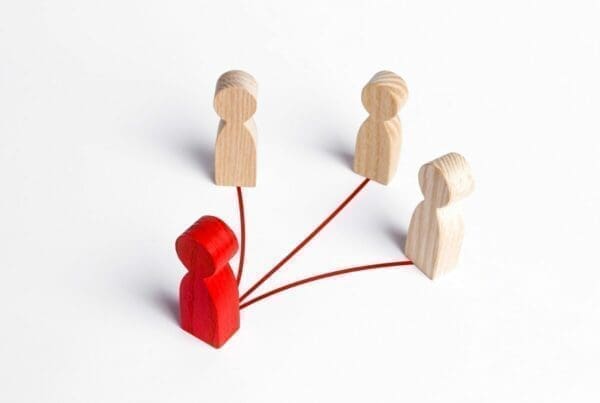I Hear You Loud and Clear
Empathy is an important personal quality in today’s business environment. Companies are reassessing their positions on ‘headline’ issues like leadership styles, diversity and bias, and employee mental health and wellbeing. And consumers, customers and current and potential employees increasingly expect businesses to embrace virtues like sustainability, fair trade, and economic justice. It’s challenging. And it calls for empathy.
In this article, we look at what empathy is, and how to use it. We explore it from different angles, including what leadership expert Daniel Goleman has to say. And we talk about how empathy fits into social media and marketing. You’re not going soft by being empathetic. It’s fine to be firm and show leadership when you need it. But you’ll build a better working culture if you are empathetic. As long as you remember to stay authentic!
Why You Need to Read This
Empathy is a must-have for career success because it improves your capacity to communicate with others. It helps you be part of a team and improves your leadership skills. Observers say, building the ability to empathise is one of the twenty-first century’s most important tasks. In 2017, 20% of US employers offered managers empathy training. In a recent survey of 150 CEOs, over 80% recognised empathy as key to success.
What Actually is Empathy?
Empathy is the ability to understand emotionally what others feel. It involves seeing things from their point of view and imagining yourself in their place. Stand in the other person’s shoes and understand what they must be feeling.
People are generally well attuned to their own feelings and emotions. Getting into someone else’s head can be a bit harder. And yet knowing someone is in trouble and being indifferent, or even hostile seems totally incomprehensible. That’s why, when leaders and managers are intolerant in the workplace and lack empathy, it damages morale.
4 Attributes of Empathy
If you want to build up your empathy, here are four key attributes to work on:
- Perspective taking.
- Not being judgemental.
- Recognising emotion in another person.
- Communicating your understanding of someone else’s emotions.
How Can Empathy Help in a Business?
You get out what you put in:
- Improved communication.
- Stronger working relationships.
- Better creative thinking.
- Increased sales and investment opportunities.
- Enhanced customer service.
- More productive job interviews.
Everyone brings their own values, understandings and experiences to work. That’s why conflicts can arise, from the differences between people. But by using your ability to empathise and understand, you can smooth out conflicts. And you’ll encourage others to do the same, by setting an example.
Empathy Helps with Social Connections. And It’s Good for our Health

Empathy allows us to build social connections with colleagues. By understanding what people are thinking and feeling, we’re able to respond appropriately according to the circumstances. As the pandemic has reminded us, a lack of social connection affects our physical and psychological well-being.
There’s no getting away from talking about mental health, it’s one of today’s biggest concerns. Working on your empathy also improves your ability to effectively manage your own feelings and your response to situations. Developing empathy, including for yourself, helps you become better equipped to stay calm and handle challenges. And you’ll be more effective in dealing with stress.
Empathy’s Important in Friendship and Relationships
Empathy is the glue that makes friendships come to life. Friends who are skilled at understanding each other and listening are less likely to have disagreements. And they’re better at resolving them when they do arise.
We need empathy to develop intimacy, trust and belonging. Empathy also helps maintain social order and cooperation, by enabling people to respect, understand and relate to those around them. And as our response to the Ukraine crisis shows, empathy makes it difficult to ignore the suffering of others
It’s Also Important in Health and Social Care
Empathy is particularly important in social care and medicine. Residential service users and others have improved outcomes when they experience empathy. Empathetic care workers are more effective and can balance their roles better.
And we all know the difference it makes when we’re ill if the doctors and nurses care about our mental well-being. We’re not imagining it. There’s a wide range of evidence that doctors and nurses who are empathetic tend to provide better care. Studies also suggest that being treated with dignity and respect matters more for patient satisfaction than pain control.
The Importance of Empathy in Leadership
Mentioning dignity and respect brings us to leadership in the workplace. As we’ve been saying, empathy is an interpersonal skill needed to build strong relationships with others. Empathetic leaders set the model for the leadership skills people need to lead teams.

The bottom line is, empathy is sound business sense. Benefits of empathetic leadership include:
- Builds good relationships: empathy can help you connect emotionally with team members and identify their personal interests and needs.
- Promotes teamwork.
- Supports work-life balance and reduces stress.
- Creates higher employee retention rates.
- Maximises productivity.
- Makes people feel appreciated and encourages them to be innovative.
We mentioned the CEO survey in which over 80% recognised empathy as key to success. Here are some more stats to ponder. In a poll of 1,300 workers from 13 countries by Dale Carnegie Training about the quality they desired most in a boss, 88% of employees said they valued bosses who listened to them. And 87% wanted their bosses to show sincere appreciation.
Where Does Empathy Fit into Emotional Intelligence?
Emotional intelligence frequently gets referenced in business articles. It’s the ability to recognise and manage your own and other people’s emotions. And that involves empathy. The psychologist Daniel Goleman wrote about emotional intelligence in his work on leadership styles. He had theories about empathy, too. We’ll talk about those in a moment.
Demonstrating empathy in the workplace is a key part of emotional intelligence and effective leadership. As we said, it also improves human interactions, leading to more effective communication and positive outcomes. So don’t hold back!

Dealing with Employees’ Problems
Team members with personal issues or problems in their home life need leaders and managers to empathise with them. This means seeing their perspective, understanding their personality and communicating with them appropriately.
And remember, empathy isn’t the same as sympathy. Sympathy and compassion tend to involve making a passive connection. Empathy generally involves a more active effort to understand the other person. That’s why, when we’re grieving, common responses like “sorry for your loss” can sound hollow. It can even make us feel like saying, are you really?! But that reply might put the other person off feeling sympathetic towards us!
What Kinds of Empathy are There?
Psychologists talk about these three kinds of empathy:

- Affective empathy: Ability to understand someone’s emotions and respond appropriately. This may lead to feeling concerned for the other person’s well-being. Or, it may lead to feelings of personal distress.
- Somatic empathy: A physical reaction in response to what another person is experiencing. People sometimes physically experience what another person is feeling. When you see someone else feeling embarrassed, you might start to blush or feel tight in your stomach.
- Cognitive empathy: Being able to understand another person’s state and what they might be feeling in response to another person’s situation.
This is related to what psychologists call the theory of mind, or, thinking about what other people are thinking.
Now let’s look at another three kinds of empathy. Leadership experts Daniel Goleman and Paul Ekman identified these types:
- Cognitive empathy: Understanding how the other person feels and what they might be thinking. Some people call this perspective-taking.
- Emotional empathy: You feel physically along with the other person, as though their emotions were contagious. As mentioned in the previous list, this can also extend to physical sensations. So, it hurts us when someone injures themselves.
- Compassionate empathy: We not only understand a person’s predicament and feel with them, but we are also spontaneously moved to help if need be.
- Compassionate empathy means balancing cognitive and emotional empathy. This enables us to act without being overcome by our feelings or jumping into action. Sometimes you need to have boundaries or you can be overwhelmed. We have some tips at the end.
Take a Moment for Compassion
While we’re talking about compassionate empathy, here’s a shout-out for compassion in the workplace. Compassion creates space for active communication between colleagues. Employees in a compassionate work atmosphere can vent their professional troubles to each other without embarrassment. It lets the stress get evened out and increases the likelihood of greater productivity.

Here are some ways to show compassion as part of developing your empathy at work:
- Get to know your colleagues better.
- Take notice of their mental well-being.
- Encourage constructive criticism in feedback, and be prompt in responding – especially to agencies and freelancers!
Where Does Empathy Fit into Business Communication?
Negotiations and client and customer relationships generally call for cognitive empathy, rather than emotional empathy. Cognitive empathy helps us understand the other person’s position, and why their actions make perfect sense to them. Even though they might not to us! Empathy helps us communicate our ideas in a way that makes sense to others. And it helps others understand when they communicate with us.
Empathy in Social Media
Empathy in social media and digital helps us put ourselves in the shoes of the person reading our content. You’re engaging with human beings, even in cyberspace. That means working out what you want to say and trying to predict how they will react. Rather than waiting to find out.
‘Social’ isn’t just about getting the consumer’s attention! It’s getting their emotional empathy, our instinctive, animal response, first of all. You do that with the image and the headline, and in a post, the first few lines. If they read on, you’ll get their cognitive empathy, as they realise you’re offering something that will benefit them.
Okay, I’ll Buy into This
Let’s look at how cognitive empathy works with brands and businesses. In 1958, James Bowlby defined attachment as a deep and enduring emotional bond between two people. Each person seeks closeness and feels more secure in the presence of the attachment figure.
We’re programmed from birth to seek attachments, for survival. As we grow, we develop cognitive empathy, which helps us recognise things we will benefit from. This is at the heart of our wanting to join communities of different kinds or connect with sympathetic people. The attachment also happens when we have positive experiences with brands or businesses and develop loyalty. Retailers can build our empathy through sympathetic checkout staff. But clumsy customer relations can kill our empathy for a business stone dead.
10 Signs That You Have Empathy

- Good at really listening to what others have to say.
- People often tell you about their problems.
- Good at picking up how other people are feeling.
- People come to you for advice.
- Often feel overwhelmed by tragic events.
- Try to help others who are suffering.
- Good at telling when people aren’t being honest.
- Sometimes feel drained or overwhelmed in social situations.
- Care deeply about other people.
- Find it hard to set boundaries in relationships with other people.
And Finally: Further Reading, Phrases to Remember, Stay Strong and Start with Self-Compassion
Read All About it
There are various books you can read on empathy, coming from different angles:
Sharon Steed’s Empathy At Work examines the most impactful empathetic actions. It also explains how to have conversations about incorporating these in your work life.
Michael Ventura’s Applied Empathy: The New Language of Leadership is about seeing through other people’s eyes, to boost your business.
You may come into contact with someone in trauma, and need to be empathetic in relating to them. Katherine Manning has written a book about this. It’s called the Empathetic Workplace: 5 Steps to a Compassionate, Calm and Confident Response to Trauma on the Job.
And if you want maximum detail on this, download an excerpt of Karla McLaren’s The Art of Empathy, a complete guide to life’s most essential skill. It’s free!
Try Saying These Kind Words
Here are some empathy statements you can try saying – when appropriate, of course…
- It sounds like you did everything you could.
- The whole thing sounds so discouraging.
- This is so hard.
- I can’t believe how well you’re holding up, considering the stress you’re under.
Remember to Look After Yourself

Everyone likes being supported and validated when they’re going through it. But beware of toxic empathy, when you over-identify with someone else’s worries and neglect yourself. Here are some self-care tips:
- See other people’s problems as separate from your own.
- Stay in the moment: concentrate on the other person, but also watch how they are affecting you.
- Prevent other people’s emotions from hijacking your body: focus on making yourself feel as relaxed as you can.
- Ensure reciprocity in your relationships: set boundaries in your mind, and make sure you get the opportunity to offload your emotions as well.
Practise Self-Compassion
If this sounds difficult, don’t beat yourself up. Empathy isn’t always a top priority for people in business, but hopefully reading this has encouraged you to do more to show it. The research shows that 98% of us have the ability to empathise with others, but experience shows we don’t necessarily do much about it! Practise empathy at work whenever you can. Think about how effective you’re being, learn from each encounter, and be kind to yourself afterwards. You can only do your best.




